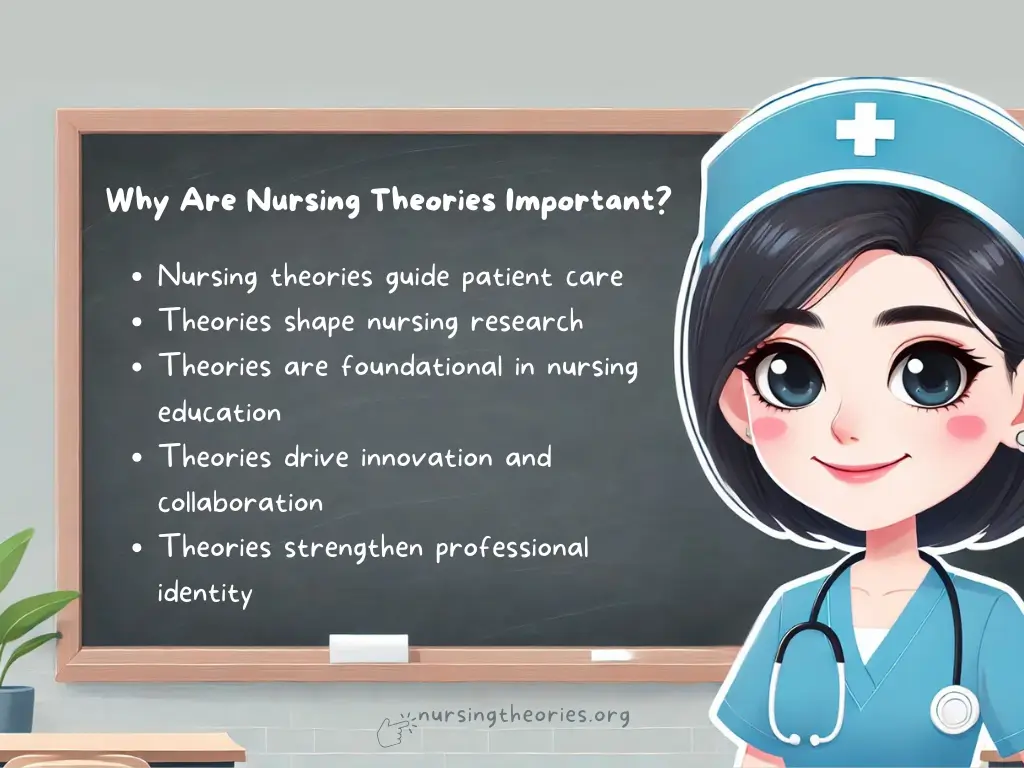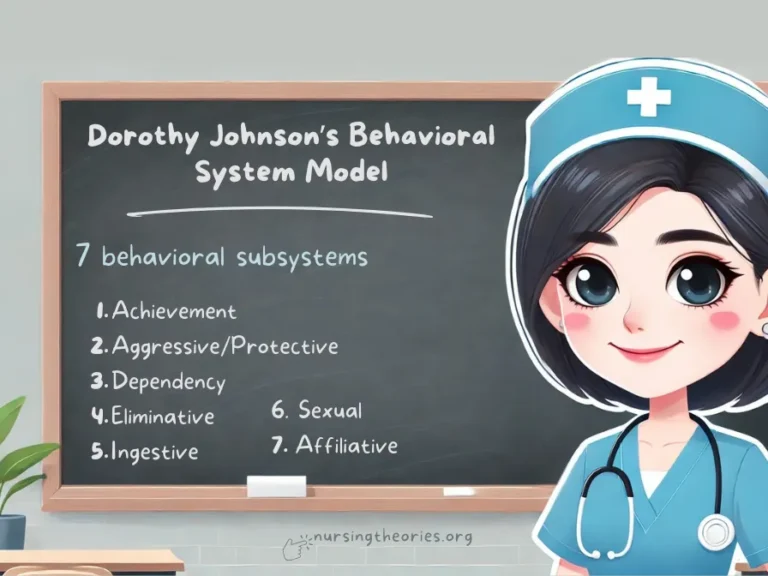Nursing theories are the backbone of the nursing profession, offering a structured framework that defines its practice, research, and education.
These theories are not just abstract ideas; they serve as practical tools that guide nurses in understanding, explaining, and improving patient care.
By providing a foundation for clinical decision-making, nursing theories ensure care is consistent, evidence-based, and patient-centered.
But why are nursing theories so vital?
They distinguish nursing as a unique discipline within healthcare, emphasizing its holistic and compassionate approach.
Beyond shaping everyday practice, they drive innovation, support professional growth, and prepare nurses to meet the evolving needs of patients and communities.
This article explores the critical role of nursing theories in clinical practice, research, and education, highlighting their profound impact on patient outcomes, professional identity, and the future of nursing.

What You’ve Learned
- Nursing theories guide patient care: They provide structured frameworks for assessing, planning, implementing, and evaluating care, ensuring that nursing interventions are evidence-based, holistic, and patient-centered.
- Theories shape nursing research: By framing research questions and guiding data analysis, nursing theories connect abstract concepts to practical applications, driving advancements in knowledge and improving care.
- Theories are foundational in nursing education: They help structure curricula, foster critical thinking, and prepare nurses to apply theoretical knowledge in real-world settings, bridging the gap between theory and practice.
- Theories drive innovation and collaboration: Nursing theories inspire new care models and foster interdisciplinary teamwork by providing a shared language and framework for addressing patient needs.
- Theories strengthen professional identity: By defining the unique values and goals of nursing, theories empower nurses to advocate for their role in healthcare and emphasize the holistic, compassionate care that distinguishes the profession.
Nursing Theories in Clinical Practice
Nursing theories play a pivotal role in clinical practice by offering structured approaches to patient care.
They ensure that interventions are evidence-based, patient-centered, and aligned with the holistic values of the profession.
By guiding nurses in assessing, planning, and evaluating care, these theories help improve patient outcomes and elevate the quality of practice.
Guiding Patient Care
Nursing theories provide frameworks that shape every step of the nursing process, from assessment to evaluation.
They help nurses understand patient needs, design appropriate interventions, and measure outcomes effectively.
Examples in Practice:
- Kolcaba’s Theory of Comfort: Guides nurses in assessing and addressing a patient’s physical, emotional, and spiritual comfort, particularly in settings like palliative care or post-operative recovery.
- Peplau’s Theory of Interpersonal Relations: Emphasizes the importance of building trust and effective communication between nurses and patients, improving collaboration and adherence to care plans.
Reflective Question:
How can you use nursing theories to approach your patients’ needs more systematically and effectively?
Improving Patient Outcomes
By applying nursing theories, nurses can implement evidence-based interventions that have been shown to enhance patient outcomes.
Theories also ensure care is holistic, addressing not just physical health but also emotional, social, and spiritual well-being.
Example in Practice:
Using Watson’s Theory of Human Caring, a nurse may combine clinical expertise with compassionate care, creating a healing environment that fosters both physical recovery and emotional well-being.
Key Insight:
When patient care is guided by theory, it becomes more intentional, consistent, and effective.
Enhancing Professional Autonomy
Nursing theories empower nurses to make informed, independent decisions, reinforcing the profession’s unique identity and contributions to healthcare.
By relying on theoretical frameworks, nurses can confidently justify their actions and advocate for their patients.
Example in Practice:
A nurse using Orem’s Self-Care Deficit Theory can independently assess a patient’s ability to manage their own health and implement interventions to support their independence, such as education on diabetes management.
Reflective Question:
How can nursing theories strengthen your ability to advocate for patients and make decisions independently?
Nursing Theories in Research
Research is a cornerstone of nursing, driving advancements in knowledge and improving patient care.
Nursing theories play a critical role in this process by providing a foundation for inquiry, guiding data interpretation, and linking research findings to practical applications.
Without nursing theories, research efforts would lack the focus and cohesion needed to advance the profession effectively.
Framing Research Questions
Nursing theories serve as a starting point for developing research questions.
They help researchers identify specific phenomena to study, ensuring the research is relevant and aligned with the profession’s goals.
Example in Research:
A study examining the impact of nurse-patient communication on patient satisfaction could use Peplau’s Theory of Interpersonal Relations to frame research questions, such as:
- How does the quality of communication affect trust between nurses and patients?
- What communication strategies are most effective in improving patient outcomes?
Key Insight:
Nursing theories provide a lens through which researchers can focus their efforts on meaningful and actionable questions.
Analyzing Data and Interpreting Findings
Theories also guide researchers in analyzing data and interpreting findings.
By connecting data to theoretical frameworks, researchers can generate insights that are both valid and applicable to nursing practice.
Example in Research:
A study measuring the effectiveness of comfort interventions in oncology patients might use Kolcaba’s Theory of Comfort to categorize findings into relief, ease, and transcendence, ensuring the results align with theoretical definitions of comfort.
Reflective Question:
How can nursing theories help you make sense of research findings and translate them into practice?
Bridging Theory and Practice
One of the most significant contributions of nursing theories to research is their ability to bridge the gap between abstract concepts and real-world applications.
Theories translate research findings into practical interventions that improve patient care.
Example in Practice:
Research informed by Orem’s Self-Care Deficit Theory might lead to the development of patient education programs that empower individuals to manage chronic conditions like hypertension or diabetes.
Key Insight:
Nursing theories ensure that research findings are not only theoretical but also actionable, making a tangible difference in patient care.
Nursing Theories in Education
Nursing education shapes the foundation of professional practice, and nursing theories are integral to this process.
They provide a framework for structuring curricula, fostering critical thinking, and preparing nurses to apply theoretical knowledge in real-world settings.
By integrating nursing theories into education, students learn to connect abstract concepts to practical care, enhancing their ability to navigate complex clinical situations.
Shaping Nursing Curricula
Nursing theories form the backbone of nursing curricula, offering a logical progression from foundational concepts to advanced practice.
Grand theories, middle-range theories, and practice-level theories are introduced in sequence, helping students build their understanding gradually.
Example in Education:
A foundational course might explore Rogers’ Science of Unitary Human Beings to introduce students to the holistic philosophy of nursing, while later courses incorporate Peplau’s Theory of Interpersonal Relations to teach effective communication and therapeutic relationships.
Reflective Question:
How does learning about nursing theories shape your understanding of what it means to be a nurse?
Teaching Critical Thinking
Nursing theories are essential tools for teaching students to analyze clinical situations critically.
By providing structured frameworks, theories help students approach complex problems systematically and make sound decisions.
Example in Practice:
A case study on managing chronic pain might use Kolcaba’s Theory of Comfort to teach students how to assess different dimensions of discomfort — physical, emotional, and spiritual — and design interventions that address each aspect.
Key Insight:
Theories encourage students to move beyond task-oriented care, fostering a deeper understanding of patient needs and outcomes.
Preparing Nurses for the Future
By integrating nursing theories into education, programs prepare students to adapt to evolving healthcare challenges.
Theories help students understand the dynamic nature of nursing and equip them with the skills to innovate and lead.
Example in Education:
Incorporating Benner’s From Novice to Expert Framework allows students to reflect on their progression from beginners to advanced practitioners, fostering a sense of growth and professional identity.
Reflective Question:
How can understanding your progression through nursing theory frameworks help you achieve your career goals?
The Broader Impact of Nursing Theories
The influence of nursing theories extends beyond individual practice, research, and education.
These frameworks contribute to the profession’s growth by fostering interdisciplinary collaboration, driving innovation, and strengthening nursing’s unique identity within healthcare.
Understanding their broader impact highlights the transformative power of nursing theories.
Fostering Interdisciplinary Collaboration
Nursing theories provide a common language and framework that facilitate collaboration with other healthcare disciplines.
By defining nursing’s unique role, theories help align nursing goals with those of medicine, social work, psychology, and other fields.
Example in Practice:
Using Peplau’s Theory of Interpersonal Relations, a nurse working in mental health can collaborate with psychologists and social workers to develop a comprehensive care plan that addresses both emotional and social needs.
Key Insight:
Nursing theories bridge gaps between disciplines, ensuring cohesive and effective care for patients.
Driving Innovation in Healthcare
Nursing theories inspire creative approaches to care delivery and patient engagement.
By encouraging nurses to think critically and holistically, theories lead to innovative practices that improve outcomes and patient experiences.
Example in Practice:
Telehealth programs developed during the COVID-19 pandemic often integrated principles from nursing theories, such as ensuring emotional support (Watson’s Theory of Human Caring) while delivering virtual care.
Reflective Question:
How can nursing theories inspire you to develop new ways to meet the needs of your patients?
Strengthening Professional Identity
Nursing theories define the values, goals, and scope of the profession, distinguishing it from other healthcare fields.
They emphasize the holistic, patient-centered approach that makes nursing unique and essential.
Example in Practice:
By using Orem’s Self-Care Deficit Theory, nurses can articulate their role in empowering patients to achieve independence in managing their health, reinforcing nursing’s focus on promoting autonomy and well-being.
Key Insight:
Understanding nursing theories deepens your sense of purpose and connection to the profession, helping you advocate for its contributions to healthcare.
Conclusion
Nursing theories are essential to the profession, serving as the foundation for practice, research, and education.
They guide nurses in delivering patient-centered care, framing research questions, and fostering critical thinking in educational settings.
Beyond their practical applications, nursing theories shape the profession’s identity, promoting holistic and compassionate approaches that set nursing apart from other healthcare disciplines.
By applying nursing theories, nurses can improve patient outcomes, develop innovative care models, and strengthen their role within interdisciplinary teams.
These frameworks empower nurses to approach challenges with confidence, ensuring that their work remains both evidence-based and deeply human.
Final Reflective Question:
How can incorporating nursing theories into your practice help you grow as a professional and improve the lives of your patients?




